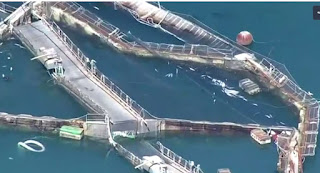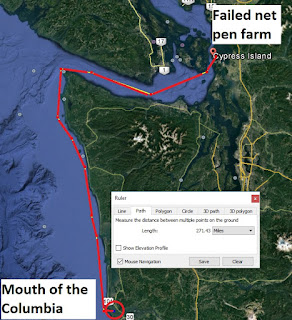Killing a native species with pesticides
in Willapa Bay. Based on what science?
There's a shrimp burrowing through trust in DOE's decision making.
The Department of Ecology has released its Draft Environmental Impact Statement on the application of Imidacloprid on up to 2,425 acres of shellfish beds in Willapa Bay over a 5 year period. The DEIS notes on page 1: "The Willapa Grays Harbor Oyster Growers Association (WGHOGA) and Washington State University's Long Beach Research and Extension Unit began testing imidacloprid (a neonicotinoid instecticide) in 1996..." WSU's Kim Patten has been involved since 1996, being the head of the Extension Office since 1990. Kim Patten owns tidelands which benefit directly from DOE's reliance on his studies, comments, and/or papers.
"Dr. Patten led most of the studies
of the effectiveness of imidacloprid in reducing burrowing
shrimp densities in Willapa Bay, Washington"
(DEIS, page A-10)
Shellfish bed owner, user of state resources
for personal gain, Kim Patten
Education: Bachelor’s degree in plant science
from University of California-Davis in 1977;
master’s degree in horticulture from Iowa State University in 1980;
Ph.D. in horticulture from Washington State University in 1984
Aquaculture is not horticulture.
Aquaculture is not horticulture.
DOE was aware of the conflict of interest, but chose to ignore it. [click here for letter provided to DOE's director Maia Bellon in January of this year]
September 8, after an investigation begun in January, the Washington State Executive Ethics Board found there "...is reasonable cause to believe..." that Kim Patten has or may be violating RCW 42.52, the Ethics in Public Service law. The detailed conflicts of interest and use of public resources for individual gain detailed in the investigation, were known to the Department of Ecology prior to their decision to renew and modify the permit for the application of the herbicide Imazamox to shellfish beds in Willapa Bay. Despite knowledge of the clear conflict of interest - detailed in a comment letter to DOE which pointed out his ownership of tidelands which would benefit from issuance of the permit- DOE simply dismissed the detailed information in their response to comments (p. 8 bottom) and said:
"Ecology is not aware of an instance where purposely misleading data or falsified data has been submitted regarding this permit. Additionally, we rely upon the best available science at the time that the Ecology action is taken."
Integrity above all.
The Department of Ecology has many responsibilities to the public, but paramount to all of these is trust. Trust that when DOE makes a decision it is made based on studies created by those who have no conflict of interest in the outcome of those studies. Trust that when DOE is provided summaries of studies all studies related to the question at hand are provided, not a select few which support the sought for outcome, which would result in financial gain to the person providing those studies. Trust that when a probable conflict of interest is pointed out they not dismiss it but examine the questions completely. Once again, DOE is aware of Kim Patten's clear conflict of interest in his supporting the application of the pesticide Imidacloprid on Willapa Bay shellfish beds and public waters.
Get involved.
Spraying pesticides onto Willapa Bay shellfish beds is a bad idea, no matter who creates the "science." There are alternative growing methods used by Taylor Shellfish, Coast Seafoods and others who have said they do not need to use Imidacloprid. Get involved and tell DOE to reject this DEIS on its face and not approve a permit. Comments - and a copy of the ethics violation - may be sent to DOE at:
Email: burrowingshrimp@ecy.wa.gov
Derek Rockett, droc461@ecy.wa.gov
Water Quality Program
Washington State Department of Ecology
Southwest Regional Office
PO Box 47775
Olympia, WA 98504
Attend the Open House/Public Hearings.
Open House/Public Hearing
Oct 7 and Oct 10
Most effectively: Stop buying/eating oysters and clams from Willapa Bay until this proposal is dropped.



























